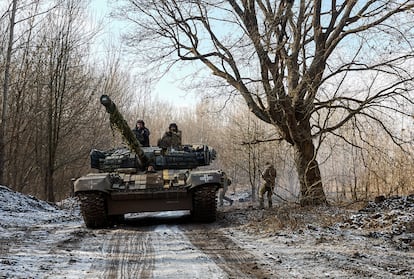Trump wants Ukraine’s rare earth elements and Zelenskiy is willing to ‘sign an agreement’
US president makes support for Kyiv conditional on exploitation of critical minerals worth $500 billion


Among the many aggressive proposals that Donald Trump has tabled since he returned to the White House in January, there is one that is not of his own making. The Republican president has reiterated that the condition for maintaining support for Kyiv’s war effort is that the U.S. has access to Ukraine’s critical mineral reserves. “We’re looking to do a deal with Ukraine, where they’re going to secure what we’re giving them with their rare earth and other things,” Trump said on February 3. Both the president and his team have been insistent on the issue since then. German Chancellor Olaf Scholz criticized it as a “very selfish” policy, but the truth is that the first person to offer the exchange was Ukrainian President Volodymyr Zelenskiy.
Zelenskiy traveled to the United States in September 2024 with his “plan for victory” under his arm, a document that includes several defense measures that Ukraine’s allies would be asked to guarantee to give Kyiv a strong position in the face of hypothetical peace negotiations. The Ukrainian head of state presented the plan to then-U.S. president Joe Biden, the former vice president and Democratic candidate in the elections, Kamala Harris, and Trump. Zelenskiy’s office asked for a meeting with the then-Republican candidate as a priority, and they only obtained it at the 11th hour, shortly before returning to Europe.
Trump left the interview expressing his satisfaction with the “very interesting” proposals that Zelenskiy had presented to him. The Republican did not specify which points of the plan he was referring to, but one of them was precisely the access of companies from allied countries to Ukrainian rare earths.
Rare earths are deposits of rare minerals that are critical to industry, especially in the technology sector. Ukraine is particularly rich in minerals such as titanium, graphite, lithium, and uranium. The New York Times reported that the Zelenskiy and Biden governments were close to signing an agreement to exploit these deposits at the end of 2024, but the Ukrainian side put the brakes on it in order to wait for the incoming Trump administration.
White House national security adviser Mike Waltz said in an interview on NBC last Sunday that Trump’s priority is to ensure Washington’s military investment in Ukraine returns from its natural resources: “We need to recoup those costs. And that is going to be a partnership with the Ukrainians, in terms of their rare earths, their natural resources, and their oil and gas, and also buying ours. Those conversations are going to happen this week.” Waltz confirmed that the two presidents are scheduled to meet in the coming days, while Zelenskiy is due to meet with Vice President J. D. Vance this week during the Munich Security Conference.
On February 7, Zelenskiy told Reuters that his government is willing to “sign an agreement” with the United States for the exploitation of these minerals. He stressed that Kyiv will not just hand them over, but rather it must be a mutually beneficial pact: “The Americans helped the most, and therefore the Americans should earn the most. And they should have this priority, and they will.”
$500 billion
Trump said Monday in an interview on Fox that he wants to be compensated for the aid provided so far and in the future, and he set a price: “They have tremendously valuable land in terms of rare earth, in terms of oil and gas, in terms of other things. I want to have our money secured. They may make a deal, they may not make a deal. They may be Russian someday, or they may not be Russian someday. I told them that I want the equivalent, like $500 billion of rare earth, and they’ve essentially agreed to do that.”
Trump’s demand has been criticized in particular by the German chancellor. “Ukraine is under attack and we are helping it, without asking to be paid in return. This should be everyone’s position,” Scholz told RND on February 8.
Zelenskiy’s plan for victory also included other measures that seemed designed to convince the new U.S. president to maintain military assistance to Ukraine. Trump, who is in favour of reducing his country’s weight in NATO, in September heard Zelenskiy’s proposal to replace American troops in Europe with Ukrainian soldiers, but only after the war with Russia is over.
From that meeting between Zelenskiy and Trump in September 2024, what stood out above all were the Ukrainian leader’s words about the injustice of his country giving up its nuclear arsenal when it gained independence in the 1990s. The number one point of the plan for victory is that Kyiv receives an invitation in the short term to join NATO, something that Biden and now Trump have opposed. Zelenskiy, as he himself explained, told Trump that the alternative to not being in NATO is the installation of nuclear weapons in Ukraine.
The Ukrainian leader reiterated this point on February 4 in an interview with British journalist Piers Morgan: “What kind of support package, what kind of missiles [will be offered in place of entry into NATO]? Will they give us nuclear weapons? Then let them give us nuclear weapons.”
“The chances of them getting their nuclear weapons back are somewhere between slim and zero,” responded Keith Kellogg, Trump’s special envoy for negotiations with Ukraine and Russia, in an interview with Fox.
The rare earth issue coincides with the diplomatic offensive that Trump says he is undertaking to force Russia and Ukraine to sign off on ending the war this year. The U.S. president is threatening draconian economic measures against Moscow and cutting off aid to Kyiv if there is no agreement. Ukraine is already suffering the effects of the suspension of humanitarian and economic aid through USAID: Kyiv was the largest recipient of USAID relief programmes in the world.
Sign up for our weekly newsletter to get more English-language news coverage from EL PAÍS USA Edition
Tu suscripción se está usando en otro dispositivo
¿Quieres añadir otro usuario a tu suscripción?
Si continúas leyendo en este dispositivo, no se podrá leer en el otro.
FlechaTu suscripción se está usando en otro dispositivo y solo puedes acceder a EL PAÍS desde un dispositivo a la vez.
Si quieres compartir tu cuenta, cambia tu suscripción a la modalidad Premium, así podrás añadir otro usuario. Cada uno accederá con su propia cuenta de email, lo que os permitirá personalizar vuestra experiencia en EL PAÍS.
¿Tienes una suscripción de empresa? Accede aquí para contratar más cuentas.
En el caso de no saber quién está usando tu cuenta, te recomendamos cambiar tu contraseña aquí.
Si decides continuar compartiendo tu cuenta, este mensaje se mostrará en tu dispositivo y en el de la otra persona que está usando tu cuenta de forma indefinida, afectando a tu experiencia de lectura. Puedes consultar aquí los términos y condiciones de la suscripción digital.








































